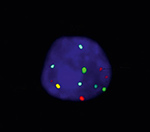FISH probe for bladder cancer
Available in Europe, the CE-IVD labelled Cytocell Aquarius P16/3c/7c/17c Probe Kit is a cost-effective, ready-to-use fluorescence in situ hybridization (FISH) probe kit for non-invasive detection of bladder cancer. Bladder cancer is becoming increasingly prevalent, and in 2012 was reported as the 5th most common cancer in Europe. While cytology screening is commonplace for diagnosing bladder cancer, a recent update to UK NICE guidelines recommended the use of FISH. FISH methods have been shown to have the same specificity as cytology screening and greater sensitivity in detecting bladder cancer cells. FISH analysis for bladder cancer is also particularly useful for monitoring treatment outcome and can aid in reducing patient mortality by detecting bladder cancer recurrence up to six months earlier than other methods. Carrying the CE mark for in vitro diagnostic use within Europe, OGT’s product accurately detects in urine samples the three most common aneuploidies associated with bladder cancer (chromosomes 3, 7 and 17). It also detects deletions of the 9p21.3 locus containing the well-known tumour suppressor gene p16 (CDKN2A) — commonly deleted in bladder cancer. The economical Cytocell Aquarius P16/3c/7c/17c Probe Kit contains ready-to-use reagents and has an easy-to-use protocol, reducing the potential for errors and increasing convenience. Specific, clear, high-intensity signals with minimal background deliver quality, reproducible and easy-to-score results ensuring clinicians can be confident in reporting.



